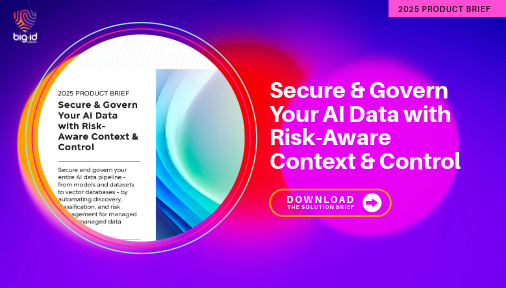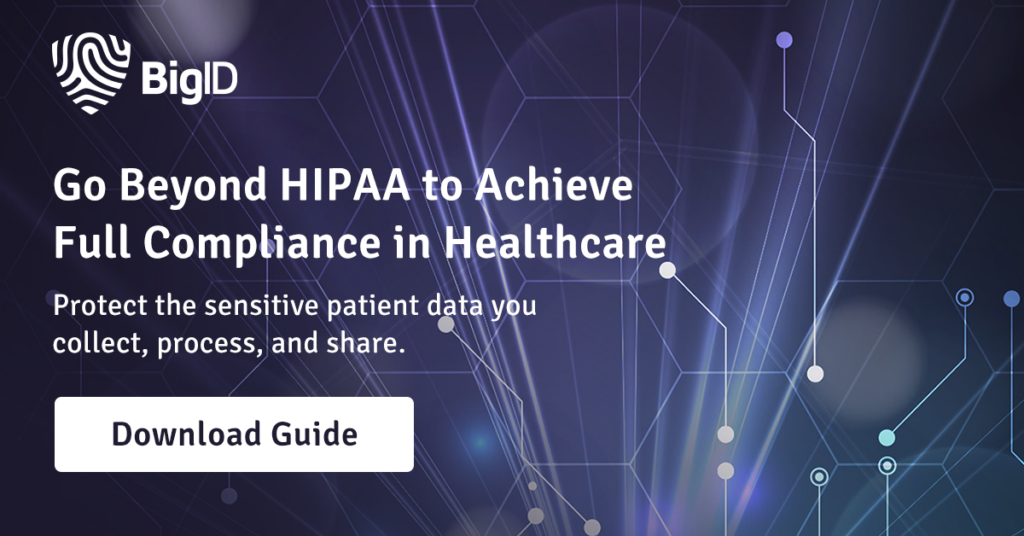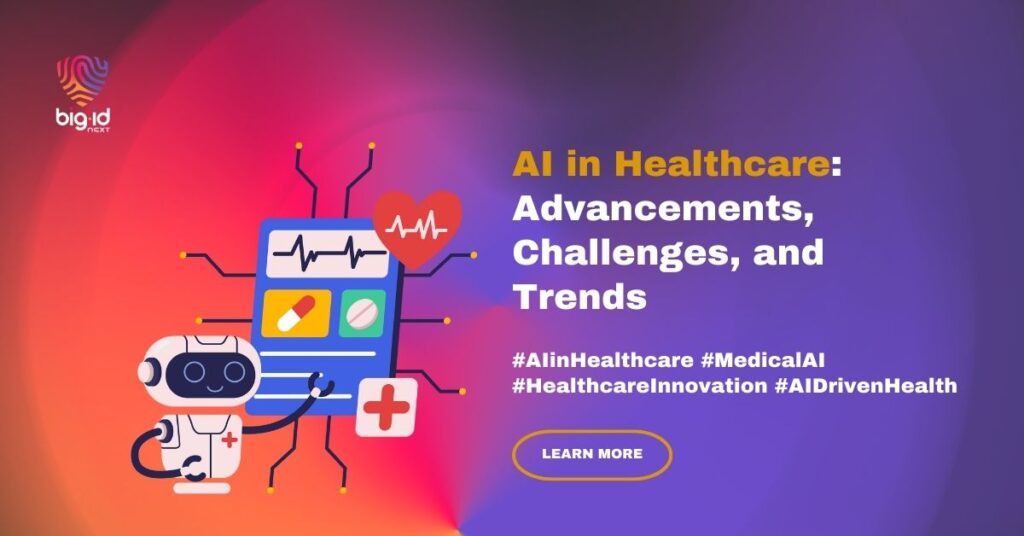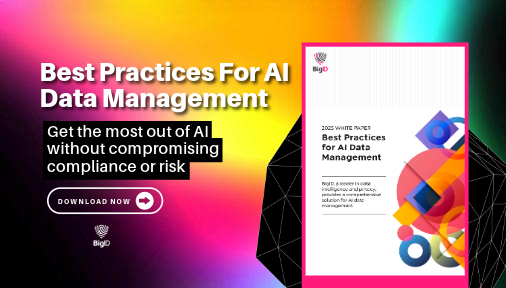L'IA dans le secteur de la santé : transformer la médecine tout en relevant les défis liés à la confidentialité, à la sécurité et à l'éthique
Intelligence artificielle (IA) transforme le secteur de la santé, améliorant les diagnostics, la personnalisation des traitements et l'efficacité administrative. Cependant, L'IA dans le secteur de la santé L'adoption croissante de l'IA soulève également des préoccupations cruciales en matière de confidentialité, de sécurité et de gouvernance des données. Les organisations doivent gérer les complexités de la conformité, des risques de cybersécurité et des considérations éthiques pour maximiser ses avantages tout en protégeant les données des patients.
D'ici 2030, l'IA dans le domaine de la santé devrait atteindre 14,4 milliards de livres sterling (TP4T187 milliards).
Qu’est-ce que l’intelligence artificielle dans le domaine de la santé ?
L'IA désigne l'utilisation de l'apprentissage automatique, du traitement automatique du langage naturel (TALN) et d'algorithmes d'apprentissage profond pour analyser les données, identifier des tendances et prendre des décisions éclairées. Dans le secteur de la santé, l'IA est utilisée pour l'analyse d'imagerie médicale, la découverte de médicaments, la chirurgie robotisée et l'analyse prédictive, aidant ainsi les cliniciens à améliorer les soins aux patients et l'efficacité opérationnelle.
Applications de l'IA dans l'industrie médicale
L’intégration de l’IA dans les soins de santé a conduit à des avancées significatives :
- Précision du diagnostic : Les algorithmes d'IA analysent les images et les données médicales pour faciliter la détection précoce des maladies. Par exemple, l'IA a été utilisée pour détecter le cancer du poumon à un stade précoce, ce qui pourrait sauver des vies.
- Traitement personnalisé : L’IA évalue les données des patients pour recommander des plans de traitement personnalisés, améliorant ainsi l’efficacité et réduisant les effets indésirables.
- Efficacité administrative : Assistants virtuels alimentés par l'IA gérer les tâches administratives, telles que la planification et la documentation, permettant aux professionnels de la santé de se concentrer davantage sur les soins aux patients.
Types de données sensibles utilisées dans le domaine de la santé et rôle de l'IA
L'IA s'appuie sur de vastes quantités de données sensibles des patients Pour fonctionner efficacement, il est essentiel de comprendre les types de données utilisées pour relever les défis liés à la confidentialité, à la sécurité et à la gouvernance.
Principaux types de données de santé sensibles
- Informations médicales protégées (PHI) – Identifiants personnels tels que noms, adresses, numéros de sécurité sociale et dossiers médicaux.
- Dossiers médicaux électroniques (DME) – Dossiers patients numérisés contenant les antécédents médicaux, les traitements et les ordonnances.
- données génomiques – Informations génétiques utilisées pour la médecine personnalisée et la prédiction des maladies.
- Données d'imagerie médicale – Radiographies, IRM, tomodensitométries et lames de pathologie analysées par l’IA pour la détection des maladies.
- Données de surveillance des patients en temps réel – Collectées à partir d’appareils portables, de capteurs IoT et de systèmes de surveillance de la santé à distance.
L'IA utilise ces données pour améliorer les diagnostics, prédire la progression des maladies et personnaliser les traitements. Cependant, la protection de ces informations sensibles reste un défi majeur.
Exemples d'IA dans le domaine de la santé
L’IA stimule l’innovation dans de nombreux domaines de la médecine, améliorant la précision, l’efficacité et les résultats pour les patients.
1. L'IA dans l'imagerie médicale
Des algorithmes basés sur l'IA analysent les images radiologiques pour détecter des maladies comme le cancer, la pneumonie et les troubles neurologiques plus rapidement que les méthodes traditionnelles. Par exemple, Google DeepMind a développé un modèle d'IA capable de détecter plus de 50 maladies oculaires avec une précision comparable à celle des meilleurs ophtalmologues.
2. L'IA dans la découverte de médicaments
L'IA accélère la découverte de médicaments en identifiant des composés potentiels et en prédisant leur efficacité. En 2023, Médecine Insilico a utilisé l’IA pour développer un nouveau médicament contre la fibrose pulmonaire, réduisant considérablement les délais de recherche.
3. L'IA dans l'analyse prédictive
Les modèles d'IA analysent les données des patients pour prédire les épidémies, les réadmissions à l'hôpital et les risques individuels pour la santé. Par exemple, Système de prédiction des risques cardiovasculaires basé sur l'IA de la Mayo Clinic aide les médecins à intervenir plus tôt chez les patients à haut risque.
4. Chatbots IA et assistants virtuels
Les assistants virtuels alimentés par l'IA, tels que le chatbot de Babylon Health, fournissent des évaluations des symptômes et suggèrent des traitements possibles, réduisant ainsi la charge de travail des professionnels de la santé.
5. L'IA dans les plans de traitement personnalisés
L'IA adapte les traitements en fonction des données génétiques et cliniques. IBM Watson, par exemple, aide les oncologues en analysant une vaste littérature médicale et les dossiers des patients afin de recommander des options thérapeutiques contre le cancer.
Menaces de l'IA dans le secteur de la santé
Bien que l’IA présente des avancées prometteuses, elle introduit également de sérieux risques liés à la cybersécurité, à la confidentialité des données et aux préoccupations éthiques.
1. Violations de données et risques de cybersécurité
Les systèmes de santé basés sur l'IA stockent des quantités massives de données sur les patients, ce qui en fait des cibles de choix pour cyberattaquesLa cyberattaque de 2023 contre une clinique de fertilité australienne, où des pirates ont volé près d'un téraoctet de données de patients, a mis en évidence les vulnérabilités cybersécurité des soins de santé.
2. Biais algorithmique et discrimination
Systèmes d'IA formés sur ensembles de données biaisés L'IA peut produire des diagnostics inexacts, affectant de manière disproportionnée les groupes sous-représentés. Par exemple, des études ont montré que certains modèles dermatologiques d'IA peinent à identifier les affections cutanées chez les patients à peau foncée en raison d'un manque de données d'entraînement diversifiées.
3. Manipulation de l'IA et attaques adverses
Les pirates informatiques peuvent manipuler les modèles d’IA en leur fournissant des données modifiées, ce qui conduit à des diagnostics erronés ou à des recommandations de traitement incorrectes.
4. Questions éthiques et juridiques
Qui est responsable lorsqu'un diagnostic basé sur l'IA est erroné ? Le déploiement de l'IA dans le secteur de la santé soulève des questions éthiques quant à l'autonomie décisionnelle et à la responsabilité. Les cadres juridiques sont souvent en retard sur les avancées technologiques, ce qui crée des incertitudes en matière de responsabilité et de conformité réglementaire.

Impact de l'intégration de l'IA sur la confidentialité, la sécurité et la gouvernance des données
Si l’IA offre de nombreux avantages, son intégration dans les systèmes de santé pose plusieurs défis :
Défis en matière de confidentialité des données
La dépendance à de vastes volumes de données patients soulève d'importantes préoccupations en matière de confidentialité. Les établissements de santé doivent se conformer à des réglementations comme la loi HIPAA pour protéger les informations des patients. Cependant, l'utilisation croissante de l'IA complique la conformité, car les protections traditionnelles de la confidentialité peuvent s'avérer inadéquates. Voici quelques points à considérer :
- Risques liés à la conformité HIPAA : Les modèles d'IA doivent être conformes HIPAA et GDPR réglementation visant à garantir la confidentialité des données des patients.
- Réidentification des données : Même les données anonymisées peuvent être réidentifiées lorsqu’elles sont combinées avec d’autres ensembles de données, mettant ainsi en danger la confidentialité des patients.
- Règlement sur les données transfrontalières : Les applications d’IA traitent souvent des données dans plusieurs juridictions, ce qui complique la conformité réglementaire.
Menaces de cybersécurité
Les systèmes d'IA sont vulnérables aux cyberattaques, qui peuvent compromettre les données sensibles des patients et perturber les services de santé. Un exemple notable est le cyberattaque sur Genea, une clinique australienne de FIV, où des pirates informatiques ont obtenu près d'un téraoctet de données sensibles sur les patients, notamment des dossiers médicaux et des informations personnelles. Voici ce que vous devez savoir :
- Attaques de ransomware : Les systèmes de santé basés sur l’IA sont de plus en plus ciblés par les ransomwares, qui bloquent l’accès aux données critiques des patients.
- Menaces d'initiés : Les employés disposant d’un accès à l’IA peuvent utiliser à mauvais escient ou divulguer des données sensibles, ce qui nécessite des contrôles d’accès stricts.
Stratégies de gouvernance pour l'IA dans le secteur de la santé
Pour garantir une utilisation éthique et sécurisée de l’IA, les organismes de santé doivent mettre en œuvre des politiques de gouvernance solides :
- Modèles d'IA transparents : Les organisations doivent documenter les processus de prise de décision en matière d’IA pour garantir la responsabilité.
- Stratégies d’atténuation des biais : La formation de l’IA avec des ensembles de données diversifiés réduit les risques de discrimination.
- Cadres de cybersécurité robustes : Les protocoles de sécurité multicouches protègent les systèmes d’IA contre les cybermenaces.

L'avenir de l'IA et des soins de santé
Le rôle de l’IA dans le domaine de la santé évolue rapidement, avec des innovations émergentes prêtes à remodeler le secteur.
1. Médecine de précision basée sur l'IA
L’IA personnalisera davantage les traitements en intégrant des données génétiques, environnementales et de style de vie pour optimiser les soins aux patients.
2. Diagnostics IA en temps réel
Les appareils d’IA portables permettront une surveillance de la santé en temps réel, fournissant des informations instantanées sur les signes vitaux et une détection précoce des maladies.
3. Chirurgie robotique pilotée par l'IA
Les robots chirurgicaux assistés par l’IA amélioreront la précision et réduiront les risques dans les procédures complexes, améliorant ainsi les taux de récupération des patients.
4. Apprentissage fédéré pour un partage sécurisé des données
De nouvelles approches d’IA comme l’apprentissage fédéré permettront aux hôpitaux de collaborer à la formation des modèles d’IA sans partager les données brutes des patients, améliorant ainsi la confidentialité et la sécurité.
5. Réglementation de l'IA et développement éthique de l'IA
Les gouvernements et les organismes de réglementation appliqueront des directives plus strictes en matière d’IA, garantissant une mise en œuvre éthique et réduisant les risques associés aux préjugés et aux failles de sécurité.
Recommandations pour les organismes de santé
Pour intégrer efficacement l’IA, les organisations de soins de santé doivent :
- Investir dans la cybersécurité : Mettre en œuvre des mesures de sécurité robustes pour protéger les systèmes d’IA contre les cybermenaces, protéger les données des patients et maintenir la confiance.
- Assurer la conformité réglementaire : Restez au courant de l’évolution des lois sur la protection des données et assurez-vous que les applications d’IA sont conformes à toutes les réglementations pertinentes.
- Promouvoir la transparence : Maintenir une documentation claire des processus de prise de décision de l’IA pour renforcer la confiance entre les patients et les professionnels de la santé.
- Favoriser la collaboration : Collaborer avec les parties prenantes, notamment les patients, les cliniciens et les décideurs politiques, pour répondre aux préoccupations éthiques et aligner les applications d’IA sur les valeurs sociétales.
Sécurisez votre écosystème d'IA avec BigID Next
L'IA révolutionne le secteur de la santé, offrant des avancées majeures en matière de diagnostic, de personnalisation des traitements et de prise en charge des patients. Cependant, son adoption généralisée dans le secteur de la santé pose également des défis majeurs, notamment en matière de confidentialité, de sécurité et d'éthique. Les établissements de santé doivent anticiper ces enjeux en mettant en œuvre des solutions de sécurité sur mesure.
BigID Next est la première plateforme de données modulaire à prendre en compte l'intégralité des risques liés aux données dans les domaines de la sécurité, de la conformité réglementaire et de l'IA. Elle élimine le besoin de solutions disparates et cloisonnées en combinant les capacités de DSPMDLP, gouvernance de l'accès aux données, Gouvernance des modèles d'IA, confidentialité, conservation des données, et bien plus encore, le tout au sein d'une seule plateforme cloud native.
BigID Next aide les organisations à obtenir :
- Découverte automatique complète des actifs de données d'IA : La découverte automatique de BigID Next va au-delà de l'analyse traditionnelle des données en détectant les actifs d'IA gérés et non gérés dans les environnements cloud et sur site. BigID Next identifie, inventorie et cartographie automatiquement tous les actifs de données liés à l'IA, y compris les modèles, les ensembles de données et les vecteurs.
- Premier DSPM à analyser les bases de données vectorielles de l'IA : Au cours de la Génération améliorée par récupération (RAG) les vecteurs conservent des traces des données originales qu'ils référencent, ce qui peut inclure par inadvertance des informations sensibles. BigID Next identifie et atténue l'exposition des Informations personnelles identifiables (IPI) et d'autres données à haut risque intégrées dans des vecteurs, garantissant ainsi la sécurité et la conformité de votre pipeline d'IA.
- Assistants d'IA pour la sécurité, la protection de la vie privée et la conformité : BigID Next présente les premiers assistants IA agentiques, conçus pour aider les entreprises à hiérarchiser les risques de sécurité, à automatiser les programmes de protection de la vie privée et à soutenir les responsables de la gestion des données par des recommandations intelligentes. Ces copilotes pilotés par l'IA garantissent que la conformité reste proactive et non réactive.
- Alerte et gestion des risques : Les systèmes d'IA introduisent des risques liés aux données qui vont au-delà des données elles-mêmes - et s'étendent à ceux qui ont accès aux données et modèles sensibles. Les alertes de posture de risque améliorées de BigID Next suivent en permanence et gère les risques liés à l'accèsLes utilisateurs peuvent ainsi savoir qui peut accéder à quelles données. Ceci est particulièrement critique dans les environnements d'IA, où de grands groupes d'utilisateurs interagissent souvent avec des modèles et des ensembles de données sensibles. Avec BigID Next, vous pouvez évaluer de manière proactive l'exposition des données, appliquer des contrôles d'accès et renforcer la sécurité pour protéger vos données d'IA.
Pour découvrir comment BigID Next peut vous aider à exploiter l’IA sans sacrifier la sécurité : Obtenez une démonstration 1:1 avec nos experts dès aujourd'hui.



